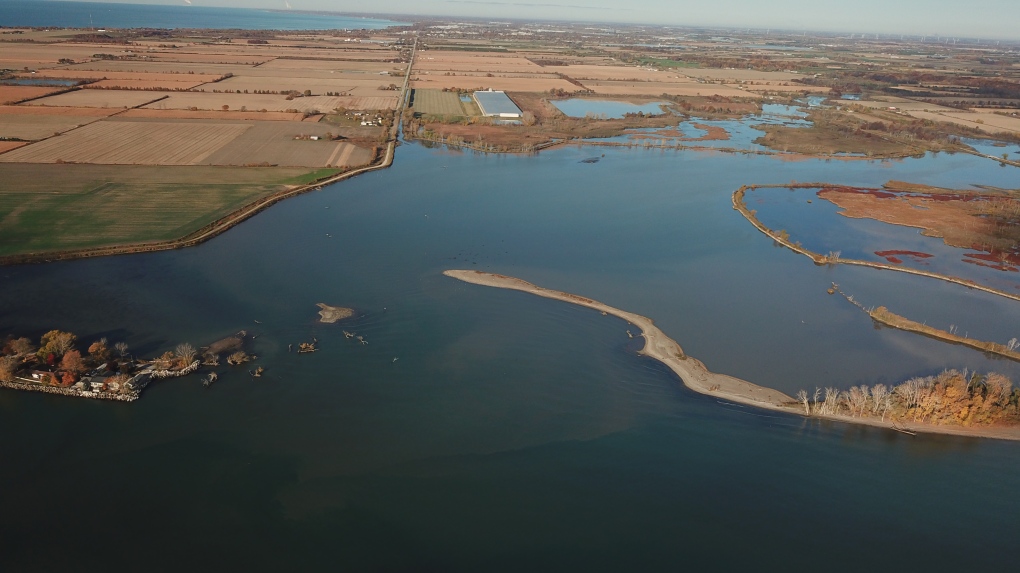Federal government invests in health of Great Lakes
 Hillman Marsh area. (Source: Wayne King)
Hillman Marsh area. (Source: Wayne King)
The federal government is investing $18.4 million dollars into the region.
“We will be able to see significant things occur on this wonderful watershed,” said Essex Region Conservation Authority (ERCA) executive director, Tim Byrne, who feels the investment to restore the Great Lakes ecosystem is generational.
“This is about helping Mother Nature,” said Windsor-Tecumseh MP, Irek Kusmierczyk. “It's about balancing the environment and the economy, so this is vital for our community.”
The ERCA will receive close to $16 million. $1.6 million is earmarked for the University of Windsor, while Flowers Canada gets $890,000.
The local funding is part of a $76 million investment to support 50 projects linked to the Great Lakes Freshwater Ecosystem Initiative.
“You look at the industrial footprint of our communities, both agriculture and manufacturing and that puts incredible stress on our freshwater, on our Great Lakes,” Kusmierczyk added.
Of those projects, 17 will be conducted in our region including the re-establishment of wetland at the top and tail of Fighting Island, which Byrne pointed out is significant breeding habitat.
“Young of the year habitat. The impact on it from aquatics and fish is immeasurable so that's a significant undertaking,” he said.
Hundreds of acres of River Canard wetland is being sheltered from Detroit River ice and flood level flows and the dyke that protects it will be re-habilitated.
“Wild rice is in there,” Byrne pointed out. “At any given time, there are tens of thousands of nesting waterfowl of all types and so it's an important thing to look at and to deal with.”
So is the Hillman Marsh in Leamington, which Byrne said is not protected and exposed to Lake Erie.
“We re-establish that lacustrine beach formation with some rocks and habitat root and fill we're going to be able to fortify and actually have Hillman Marsh re-establish itself and be sustainable,” said Byrne.
The University of Windsor is the grant to investigate nutrient anomalies that are occurring in Essex County, primarily around the Leamington watershed.
“Sturgeon Creek, Hillman Marsh area, we were primarily interested in differentiating between where some of these nutrients are coming from. We still don't know a lot about the actual sources,” said Chris Weisner, UWindsor and Great Lakes Institute for Environmental Research professor. “Identify sources and then identify and provide best management practice to address them.”
CTVNews.ca Top Stories

Prime Minister Trudeau meets Donald Trump at Mar-a-Lago
Prime Minister Justin Trudeau landed in West Palm Beach, Fla., on Friday evening to meet with U.S.-president elect Donald Trump at Mar-a-Lago, sources confirm to CTV News.
'Mayday! Mayday! Mayday!': Details emerge in Boeing 737 incident at Montreal airport
New details suggest that there were communication issues between the pilots of a charter flight and the control tower at Montreal's Mirabel airport when a Boeing 737 made an emergency landing on Wednesday.
Hit man offered $100,000 to kill Montreal crime reporter covering his trial
Political leaders and press freedom groups on Friday were left shell-shocked after Montreal news outlet La Presse revealed that a hit man had offered $100,000 to have one of its crime reporters assassinated.
Questrade lays off undisclosed number of employees
Questrade Financial Group Inc. says it has laid off an undisclosed number of employees to better fit its business strategy.
Cucumbers sold in Ontario, other provinces recalled over possible salmonella contamination
A U.S. company is recalling cucumbers sold in Ontario and other Canadian provinces due to possible salmonella contamination.
Billboard apologizes to Taylor Swift for video snafu
Billboard put together a video of some of Swift's achievements and used a clip from Kanye West's music video for the song 'Famous.'
Musk joins Trump and family for Thanksgiving at Mar-a-Lago
Elon Musk had a seat at the family table for Thanksgiving dinner at Mar-a-Lago, joining President-elect Donald Trump, Melania Trump and their 18-year-old son.
John Herdman resigns as head coach of Toronto FC
John Herdman, embroiled in the drone-spying scandal that has dogged Canada Soccer, has resigned as coach of Toronto FC.
Weekend weather: Parts of Canada could see up to 50 centimetres of snow, wind chills of -40
Winter is less than a month away, but parts of Canada are already projected to see winter-like weather.


































